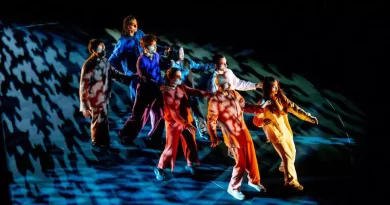“The Maids”, Donmar Warehouse
Jeremy Malies in the West End
26 October 2025
★★☆☆☆
I like productions of the frequently performed The Maids to have an obvious and dynamic social setting. Jean Genet used the real-life backdrop of the murder case he was dramatizing in which a pair of sisters working as maid servants bludgeoned their mistress to death before gouging her eyes out. The murder was on the Sarthe River in the somewhat anonymous Pays de la Loire region of France and took place in 1933.

Photo credit: Marc Brenner.
Jamie Lloyd had an interesting context for the play at Trafalgar Studios in 2016 when he chose a post-segregation Deep South with racial divides continuing and trumping class conflict. Working with a translation by Martin Crimp (truly a translation rather than a free adaptation) director Annie Kershaw transported the action to Paris in a production at Jermyn Street Theatre in 2024.
Here at the Donmar, Sydney Theatre Company’s former artistic director Kip Williams gives us The Maids set in London in our own time. We see Madame (Yerin Ha) breezing into her apartment carrying a Selfridges bag and worrying that if found guilty her criminal boyfriend will end up in Broadmoor. As with his previous multi-roling, one-actor productions of The Picture of Dorian Gray (which transferred to Theatre Royal Haymarket last year and Broadway this year, starring Sarah Snook) and Dracula (which arrives in the West End early next year, starring Cynthia Erivo), Williams uses video technology to give the play a contemporary feel.
In Williams’s radical rewrite Madame is a social media influencer – perhaps a nepo baby relying on her father’s deep pockets or just possibly a genuine if low-brow communicator. Twenty-four million friends on TikTok and Instagram (even if maid Solange played by Phia Saban is withering in her sarcasm) suggest she is doing something right, as Madame plugs Bvlgari perfume and the Balenciaga handbags that sit above racks of clothes in mirrored wardrobes dominating a set by Rosanna Vize. Much of the playing space is two gargantuan walk-in wardrobes.
The signature component of this version is the fact that Madame is for ever livestreaming. And some of the garish video design by Zakk Hein is indeed live feeds with the inevitable add-on effects beloved by young people including anime filters, face tracking, and green screen.

Lydia Wilson and Yerin Ha.
Photo credit: Marc Brenner.
Playing maid Claire, Lydia Wilson echoed my own views on some of the excesses here with, “It’s like seriously giving me the ick!” Wilson’s is the toughest part because it is she who must flit between her main role and the extended impersonations of Madame during the role-play. The actor excels when showing the character being unsure as to who she is.
Williams misses many core aspects of the play as written or at least as I understand them. Surely lines such as “I can never finish you off” indicate incest? And yet here the line is thrown away with no emphasis or traction. There is insufficient treatment of the fact that the maids are rehearsing the murder of Madame with a stopwatch ticking and evaluating every element of their preparations. Many of Williams’s vocabulary choices are weird. I think of Claire berating Solange for “indulgent florid language” and “a cycle of solipsism”. Really!
Costumes by Marg Horwell are truly chic and conjure up what most of us see only from a distance in news broadcasts of fashion weeks in European capitals. Ha, who is outstanding throughout, is at her best when suggesting the almost sexual pleasure that Madame derives from her fur coats whose prototypes began on the catwalks. The best compliment I can pay Horwell is that, as suggested in the dialogue, some of the clothes look as though they really have been designed for the performer.
After a while the whole audience will have absorbed the fact that the trio of women have technical literacy which is exceptional even for Generation Z. There was one too many visits to the well that is live streaming and sharing on the back wall of what the characters see on the screen of a smartphone. Volume levels and neon flashes (lighting by Jon Clark) became intolerable as at the end Claire takes herself into a spiral of vlogging while imagining a world in which everything is limitless be this mobile data, orgasms, or glamorous boyfriends working in the gig economy.
I am familiar with the sign in leisure venues of all kinds, “If it’s too loud you’re too old.” But I wondered if a mainstream play written in 1947 and usually enjoyed by everybody right up to Baby Boomers and the Silent Generation should be interpreted solely through phone and social media obsession. In the world depicted here, even a piece of investigative writing (exposure of crimes committed by Madame’s unseen lover) will by default be leaked in snippets on Reddit. Yes, Williams is in part puncturing all this shallowness, but he is not on the side of people who think that influencer culture may be unhealthy.
The endeavour struck me as a cake with multiple icing layers but no substantial base. And it is surely an offering geared only to the taste of young people? I have not enjoyed researching TikTok filters simply to make sense of all this. Every time the many fresh ideas allowed the production to take wing, the action crashed to a halt with a misjudged and crass reference to technology. I thought of Claire’s reprimand to Solange, “Discipline! You know absolutely fuckin’ nothin’ about discipline!” There were also random unnecessary lines from Shakespeare, most notably Macbeth. Is Williams really incapable of writing a few lines showing that a character is in two minds without this kind of borrowing?
Rackety, sexually promiscuous, and at times a vagrant, the gossip-addicted Genet might have loved the social media age and excelled in it. The superficial class resentment content in his play is explored well, with employer shopping in Knightsbridge while staff look for bargains on Facebook Marketplace. These stark differences raise a few peripheral laughs.
And yet Genet campaigned to improve conditions for immigrants to his country, risked the contemporary equivalent of deplatforming when standing up for Black activists, and spent six months living in Palestinian refugee camps. His concern for the economic privations, mistreatment, and subsequent mental breakdown of the two maids in the case he studied is unquestioned.
The play is an intelligent and considered campaigning tool, and asks questions about blurred boundaries between fantasy and reality. I just wonder if Genet would want his text to be seen (quite literally here) through the lens of an influencer’s iPhone 16. Sticking with phone terminology and using Claire’s solution for covering her tracks as a data snooper, my own solution for this production would be a factory reset.









